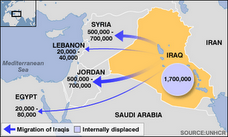The military can't fight there and in Afghanistan without approaching 'operational failure,' one critic says. Something had to give.
By Kim Murphy, Times Staff Writer, LA TIMES, February 22, 2007
LONDON — Britain's decision to pull 1,600 troops out of Iraq by spring, touted by U.S. and British leaders as a turning point in Iraqi sovereignty, was widely seen Wednesday as a telling admission that the British military could no longer sustain simultaneous wars in Afghanistan and Iraq....
"Prime Minister Tony Blair's government has been pressed to add 800 troops to Afghanistan to halt a resurgent Taliban and a worrying escalation of drug trafficking, at the same time that it is beset by criticism for joining the United States in an unpopular invasion and prolonged war in Iraq.
Vice President Dick Cheney called the reduction "an affirmation of the fact that there are parts of Iraq where things are going pretty well," and White House Press Secretary Tony Snow said the U.S.-led coalition "remains intact" even though the roster of nations contributing troops, excluding the U.S., has fallen to 25 from 35. But the Pentagon, in its most recent quarterly report to Congress, listed Basra as one of five cities outside Baghdad where violence remained "significant," and said the region was one of only two "not ready for transition" to Iraqi authorities.
Once a promising beacon, Basra suffers from sectarian violence as well as Shiite militia clashes over oil smuggling. Ferocious street battles have broken out between rival Shiite Muslim groups in provincial capitals such as Samawah, Kut and Diwaniya in the last year.
"The president's escalation plan to send more U.S. troops to Iraq is out of step with the American people and our allies," Pelosi said in a statement. "Why are thousands of additional American troops being sent to Iraq at the same time that British troops are planning to leave?"
Thursday, February 22, 2007
Subscribe to:
Post Comments (Atom)





No comments:
Post a Comment